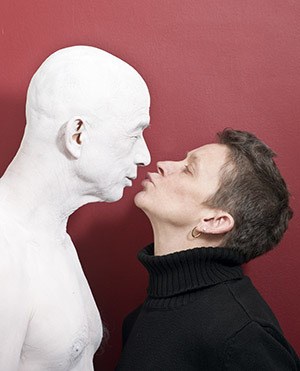Kokoro is the Japanese word for heart, and Vancouver's Kokoro Dance has been moving the hearts, souls and spirits of its audiences through provocative choreography since its inception in 1986.
But the kokoro in Kokoro Dance could just as easily refer to the two passionate dance artists at the heart of the iconic company, and the love that smolders between them.
Jay Hirabayashi and Barbara Bourget are the married lovers behind Kokoro Dance, and their company is internationally renowned for expressive dance performances that merge Eastern and Western aesthetics. They're also the producers of the Vancouver International Dance Festival (which kicks off its 13th edition March 2), an annual showcase for local, national and international contemporary dance.
Between them, Bourget and Hirabayashi have presented well over 1,000 performances and choreographed more than 130 works — an astounding achievement that has made their company a force to be reckoned with at home and abroad.
"Everything flows out of this love: our children, our grandchildren, Kokoro, the VIDF," Bourget said during an interview in Kokoro's Mount Pleasant office.
In the dance realm, Bourget and Hirabayashi's romantic-artistic collaboration is a rarity.
"There aren't that many other examples of couples running the same company," said Hirabayashi.
The pair met in 1979 in a Lower Mainland dance studio. Bourget — a Vancouver-born dancer with an impressive list of credits — had been hired by legendary choreographer Paula Ross to replace an injured dancer in an upcoming tour.
Compared to the experienced Bourget, Hirabayashi was a newbie. The Seattle native had only been dancing for ten months when he was partnered with Bourget in one of Ross pieces.
"I apologized to her because I was sweating, and she said, 'actually, I like sweat,'" recalled Hirabayashi.
"Apparently, that was very provocative," Bourget said.
At the time, life was rather complicated for both dancers. Bourget was mother to a two-year-old son, and Hirabayashi's ex was pregnant with his second child.
But despite the complications, neither dancer could ignore the chemistry between them.
"It was tumultuous and passionate and really wonderful, because I'd never fallen in love that fast and so deeply," said Bourget.
 They met in the spring, and were living together by autumn. Two years later they were married, and were on their way to carving out their current position as perennial innovators.
They met in the spring, and were living together by autumn. Two years later they were married, and were on their way to carving out their current position as perennial innovators.
On stage, their love is on display in duets such as Moan (1998).
"We slowly approach each other and we never touch," said Bourget, who will perform a solo work entitled A Simple Way as part of the 2013 VIDF. "We create this kind of third entity between us, and really charge the air."
Off stage, they — along with a bevy of exes — collaborate as parents to four children (and as grandparents to four grandchildren).
"Our kids grew up in this environment of all these caring adults who were somehow part of their family but not quite related to them by blood," said Bourget. "I think that has made everybody more open to the feeling that a family is more than just things that you can pinpoint."
After more than three decades together, Bourget and Hirabayashi are still creating, collaborating, and colliding.
"It's challenging because were never away from Kokoro, even when were at home," said Hirabayashi. "But I think we fulfill each other. We make one whole out of two."



